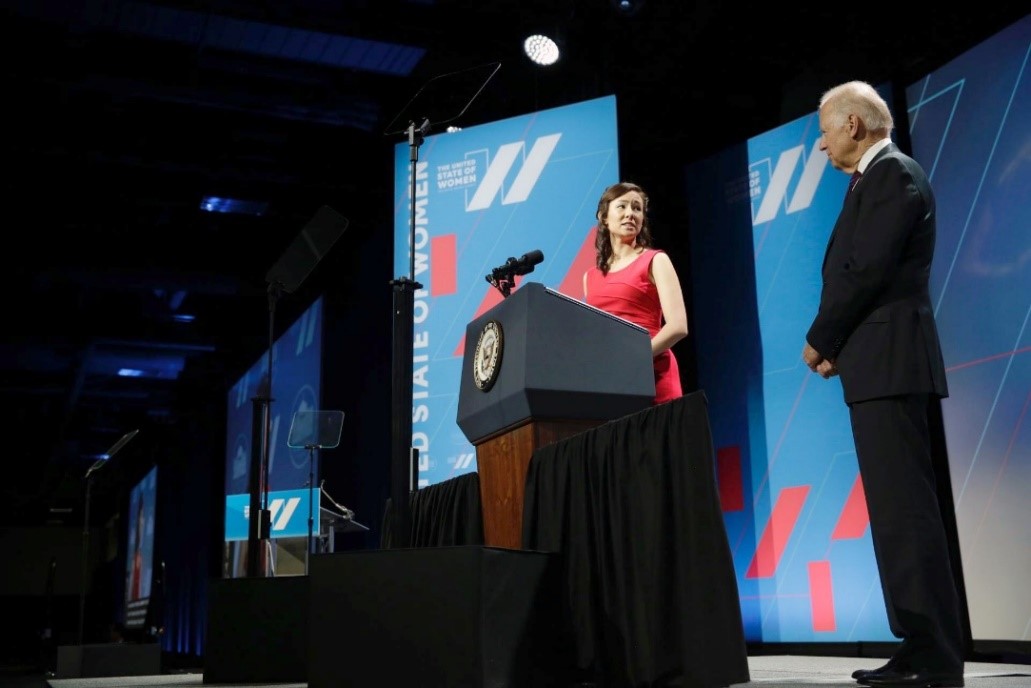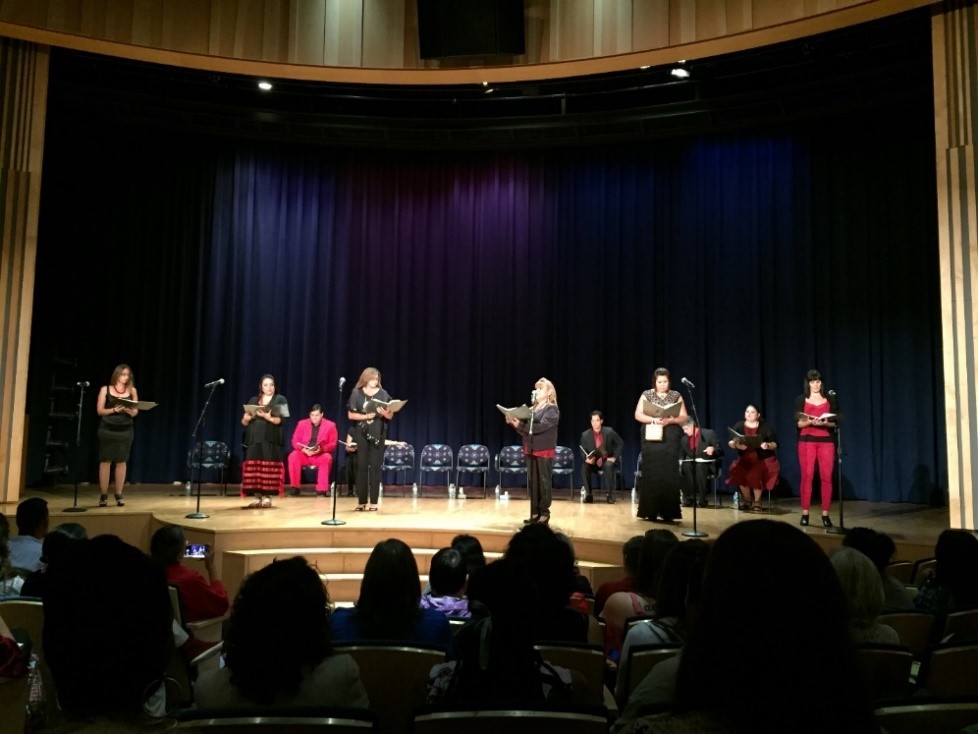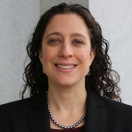
“We have to change the culture – a culture that condones, [and] too often promotes, violence against women."
- Vice President Joe Biden
The crowd of over 5,000 men and women sat quietly, eagerly – attentively listening as Vice President Joe Biden whispered into the microphone: “Over the years, I’ve heard hundreds and hundreds of testimonials from survivors – each different and specific, but all so painful in their similarity.” From every angle in the cavernous DC Convention Center, you could tell that the audience was moved – and so it came as no surprise that when the Vice President powerfully declared, “One of the most important things we did in the Violence Against Women Act was to articulate the basic moral principle that every single woman has a fundamental right to live her life free of violence,” the room erupted with applause.
Moments before the Vice President spoke, Meghan Yap, a brave student survivor and White House Champion of Change, had introduced him to the stage. “You have superpowers,” she told the audience of thousands, “whether you teach, sing, act, write, coach, or research, whatever your superpower is, you can use it to make a difference and be a part of ending rape culture. Because it’s on us, every one of us to make a change.”

These poignant moments took place at the first ever White House United State of Women Summit last month. Thousands of people from across the country and around the world – including survivors, advocates, students, policy-makers, researchers, educators, entrepreneurs, health professionals, and community organizers – gathered to celebrate the progress that has been made over the past several years, and the gaps that remain to be filled, on issues that affect women and girls in six key areas: ending violence against women, educational opportunity, women’s leadership and civic engagement, economic opportunity, health and wellness, and entrepreneurship and innovation. We also sought to set the stage to ensure that future progress continues.
Ideas for Action
The Vice President’s remarks were followed by advocates and survivors offering ideas for action to end violence against women.
For example, Joanne Smith, from the New Generation, powerfully spoke about the intersectionality of oppression that hurts all women and girls of color. Gender-based violence, she contended, must be understood in the context of public health, education, economics, reproductive justice, and racial justice. Smith offered important solutions: invest in strategies that empower women and girls; recognize that many forms of abuse are preventable, such as gun violence; and maintain the momentum of a new generation focused on ending gender violence.
Breakout seminars focused on bringing marginalized voices to the forefront, stopping trafficking of women and girls, breaking cycles of violence, and changing our culture to end violence against women. Speakers included Liz Weintraub, disability advocate and creator of the YouTube blog “Tuesdays with Liz,” who emphasized the need to get women with disabilities into leadership positions; Neil Irvin of Men Can Stop Rape about the critical role of men and boys in the anti-violence against women movement; Kym Worthy, the Wayne County, Michigan Prosecutor who has helped to drive our nationwide efforts to end the sexual assault kit backlog; and Evelyn Chumbow, who shared her story of becoming enslaved as a forced laborer in nearby Maryland.
Later in the day, the President and First Lady again brought down the house. President Obama shared: “I may be a little grayer than I was eight years ago, but this is what a feminist looks like,” eliciting a prolonged standing ovation. First Lady Michelle Obama, in conversation with Oprah Winfrey, challenged men to step up and be a part of the solution: it starts, she said, by men “being good fathers who love your daughters and are providing a solid example of what it means to be a good man in the world.” Second Lady Dr. Jill Biden also delivered remarks via video message supporting women in the military: “Their resilience and grit should not only celebrated, but supported. It requires all of us doing our part.”
Sliver of a Full Moon: Addressing Violence Against Women in Native American Communities
That evening, the Smithsonian National Museum of the American Indian hosted a performance of “Sliver of a Full Moon.” The play powerfully recounts successful efforts by Native American advocates and others to include the Special Domestic Violence Criminal Jurisdiction (SDVCJ) provisions in the 2013 reauthorization of the Violence against Women Act (VAWA), which recognized tribes’ inherent power to exercise special criminal jurisdiction over non-Indian offenders who commit domestic violence, dating violence, or violate a protection order. A new report from the National Institute of Justice (NIJ) underscores the need for such provisions: more than 84% of Alaska Native and American Indian women surveyed had experienced some form of violence in their lifetimes; and amongst those women, 97% had experienced violence by an interracial perpetrator.

A Deeper Dive: Day 2
Day 2 of the Summit allowed participants an opportunity to dive deeper into conversations on violence against women by exploring solutions to issues such as criminal justice, health care, youth leadership, and economic justice. Zoe Flowers performed her moving piece, From Ashes To Angel’s Dust: A Journey Through Womanhood, using poetry, monologues, and movement to tell stories of women silenced by violence, oppression, homophobia, shame or the impulse to please.
“You Have Superpowers”
Meghan Yap is right. We all have a superpower to do our part to support survivors, establish resources, change the culture, and ultimately, end violence against women. With the foundation and successes this Administration has made and with the inspiration I feel from this historic Summit, I cannot wait for what’s to come.
Additional Information
For additional information on the Summit, please visit the United State of Women website: www.unitedstateofwomen.org.
Click here for a list of the Administration’s accomplishments summarizing seven years’ of work in the Violence Against Women space.
Click here for a Fact Sheet announcing new Administration initiatives to support women and girls, at home and abroad.
Jaimie Woo is a Policy Analyst on the Violence Against Women team in the Office of the Vice President.


